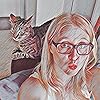Dona
asked:
Why did I waste 8 hours of reading just to be hit with very obscene language? Beautiful cover, great story idea completely wasted. I could be reading many authors who do not rely on this shock factor to sell their books. Please could someone have a rating system to let readers know what to expect? I would be so grateful.
To answer questions about
The Dictionary of Lost Words,
please sign up.
Jasmine
I guess you completely missed the point of the book entirely. ‘That’ word has not always been considered an obscenity. Hundreds of years ago it was simply a female body part. This whole book is about women’s language, it’s use, how it’s been misrepresented, or even lost, because it is men who have decided what words are important and what their meanings are. And the word isn’t even used as an obscenity in the book! It’s simply a word, made up of letters.
Honestly if that word featuring in the book a couple of times is enough to say it’s wasted, then I dare say you should wrap your ears in cotton wool or maybe never leave your house. There are a lot more obscene things happening in this world than the use of a simple 4 letter word.
Honestly if that word featuring in the book a couple of times is enough to say it’s wasted, then I dare say you should wrap your ears in cotton wool or maybe never leave your house. There are a lot more obscene things happening in this world than the use of a simple 4 letter word.
George
There is no obscenity here. There is a little--very little, compared to the novel's length--ribaldry. There are indeed taboo words, at least one quite important to the main female protagonist. All handled with care but without reticence.
And all of this occurring much sooner than 8 hours into the book, if Audible's report of 11 hrs 11 min for the whole is accurate. I cannot conceive what could be characterized as "very obscene language" anywhere near the 2/3 mark.
If you think that this modest amount of adult language constitutes a shock factor that is calculated to sell copies, you have a very warped concept of how bookselling works. And if you find that it means the novel is completely wasted on you, I am very sorry indeed for your hypersensitivity.
The only rating service I know of that you might access are the Talking
Book Topics catalogs from the Library of Congress's National Library Service for the Blind. You can find individual reviews therefrom online from your local library for the blind and physically handicapped--or the one in Utah, if you can't find one closer. They faithfully list "(Some) Strong Language", "(Some) Violence", and/or "(Some) (Explicit) Descriptions of Sex" as relevant.
Unfortunately, nowhere near all books are recorded, and these become available as a rule only about a year after initial publication, when the paperback is succeeding the hardback.
And all of this occurring much sooner than 8 hours into the book, if Audible's report of 11 hrs 11 min for the whole is accurate. I cannot conceive what could be characterized as "very obscene language" anywhere near the 2/3 mark.
If you think that this modest amount of adult language constitutes a shock factor that is calculated to sell copies, you have a very warped concept of how bookselling works. And if you find that it means the novel is completely wasted on you, I am very sorry indeed for your hypersensitivity.
The only rating service I know of that you might access are the Talking
Book Topics catalogs from the Library of Congress's National Library Service for the Blind. You can find individual reviews therefrom online from your local library for the blind and physically handicapped--or the one in Utah, if you can't find one closer. They faithfully list "(Some) Strong Language", "(Some) Violence", and/or "(Some) (Explicit) Descriptions of Sex" as relevant.
Unfortunately, nowhere near all books are recorded, and these become available as a rule only about a year after initial publication, when the paperback is succeeding the hardback.
Genny
I am very sorry you felt that a word or two ruined a whole book, when the book is about language. The whole journey of this book was Esme discovering that there are so many other words used by woman, the different social/economic classes, cultural/religious groups, etc that were not included the OED. And her journey to collect them, to understand them, to record them. Her experiences were to enlighten the reader about how language is used, recorded, and how it changes over time.
The idea that something is "obscene" is not a universal truth. A word is just a word. The meaning, the value, the importance is placed by those using the word. And these all change over time. That was the whole point of this story.
The idea that something is "obscene" is not a universal truth. A word is just a word. The meaning, the value, the importance is placed by those using the word. And these all change over time. That was the whole point of this story.
Jen
I give this comment my personal award for The Funniest Thing I Have Read on Goodreads All Year. Congratulations!
Lauren Conrad
Because that is literally the entire point of the book: that some words are less than kosher but deserve to be written down and taken as seriously as any other words. That's why.
Alyssia Cooke
I didn't find any shock factor in this at all. The whole point of Esme finding words that never made it into the dictionary is one of the critical aspects of the novel.
I would add that I assume the word c**t is the word you are referring to as the obscene language. You do realise that the word appeared in Chaucer, way back in the 14th century? Shakespeare used it in puns. It's current connotations don't remove the long and varied history the word has. It is now even included in the Oxford English Dictionary.
I would add that I assume the word c**t is the word you are referring to as the obscene language. You do realise that the word appeared in Chaucer, way back in the 14th century? Shakespeare used it in puns. It's current connotations don't remove the long and varied history the word has. It is now even included in the Oxford English Dictionary.
Kay Blinebury
This answer contains spoilers…
(view spoiler)
Joan
wow -it seems those that banned the use of those words in the OED are your soulmates.
It s anovel about language and language is what people speak.-warts and all
It s anovel about language and language is what people speak.-warts and all
Tara
You singlehandedly (and clearly unintentionally) just proved the point of the author. Well done.
Virginia Pulver
The author shows us often words are defined by one group in a far different way than by another group. Definitions and usage are influenced by gender, age, social class, etc. Furthermore, the men who dominated the decisions regarding how words would be defined in the dictionary required the support of a quote taken from a published source. In the culture of that era, that clearly excludes a huge number of words that are used among women (and men) of other social classes. I think Williams did a brilliant job of showing us how the nuances of many words were not even considered. The reference to vaginas using a harsh slang word is a good example. Men kind of hijacked the word and made what is really simply a reference to a bodily part, into a heinously vulgar word of derision. Context in defining words is significant. And the bias of only using definitions that resonated with educated men (and ignoring the experience of women from most all classes), is very clear. The ramifications are obvious. Words are not good or bad. We live in a culture where the "privileged" people define things and the rest of the society is basically ignored. This is an excellent book, for so many reasons. - Ginn
Blabip
Stick to fairy tales. Shock factor? That men controlled what words went into the dictionary? You missed the whole point!
Vienna Manzanares
“A vulgar word, well placed and said with just enough vigour, can express far more than its polite equivalent.” - Pip Williams The Dictionary of Lost Words
Catherine
A lot of words can be made obscene. As Jasmine said, "Hundreds of years ago it was simply a female body part."
I don't believe she put it in just for shock value but as a way to see how our language has evolved.
I don't believe she put it in just for shock value but as a way to see how our language has evolved.
Charmaine
I understand your concern. I, too, do not enjoy books that contain foul language. If you follow my reviews, I do a "Clean Readers" report at the end of every review to let you know if there is foul language, violence, or overly described intimate scenes.
However, I also agree with many of the comments made here in response to your question. This book is all about words/language so I guess I was not shocked to find obscene words talked about. Did I like hearing them (audio version)? No. But I do understand why they were included. This is not the case with many modern novels, however. It seems like authors just throw in the "eff" word just to be "relevant". That really bugs me!
However, I also agree with many of the comments made here in response to your question. This book is all about words/language so I guess I was not shocked to find obscene words talked about. Did I like hearing them (audio version)? No. But I do understand why they were included. This is not the case with many modern novels, however. It seems like authors just throw in the "eff" word just to be "relevant". That really bugs me!
Paul Spice
Personally, I think this statement, and the answers provided highlight the ****ing elephant in the room here, and there is me doing it.
In my case that really was just for the sake of it but in Williams's case , not at all. The use of profanity in general is an enigma. It is more and more common in use yet is still offensive and is still vulgar. The particular elephant in question is particularly vulgar, and often nasty. Why is it so often only that? Corrupted and abusive? And why almost that alone? Molly and Mollys like her would have used it in this context yet Tilda doesn't. As Mellors doesn't in reference to Lady Chatterly.
Esme's unprejudiced thirst for lost words rightly recognises their use and need for inclusion. All potentially lost words and definition.
This tale is carefully and loving managed. Warm and beautifully drawn. A showing and telling of contemporary people, social mores and attitudes to words and to life and people itself. A modern day masterpeice. A must, must read and a treasure.
In my case that really was just for the sake of it but in Williams's case , not at all. The use of profanity in general is an enigma. It is more and more common in use yet is still offensive and is still vulgar. The particular elephant in question is particularly vulgar, and often nasty. Why is it so often only that? Corrupted and abusive? And why almost that alone? Molly and Mollys like her would have used it in this context yet Tilda doesn't. As Mellors doesn't in reference to Lady Chatterly.
Esme's unprejudiced thirst for lost words rightly recognises their use and need for inclusion. All potentially lost words and definition.
This tale is carefully and loving managed. Warm and beautifully drawn. A showing and telling of contemporary people, social mores and attitudes to words and to life and people itself. A modern day masterpeice. A must, must read and a treasure.
Donna - Rosies.ReadingNook
Oh Boy I think you missed the whole point of this novel.
Jennifer Z.
Words are just that, words, you control how they effect you. If you want to clutch your pearls about certain words, so be it, point proven. I am glad you didn't get to the part about the premartial sex, you may have fainted.
Captain
Surely this is click bait. It worked!
Jon Sparks
The idea that a book like this is relying on the 'shock factor to sell their books' is stretching credibility beyond breaking point. A few mentions of a certain word, which don't even occur until a long way in, is not going to gratify those readers (if there are any!) who buy books solely for the sake of reading 'naughty' words.
And do you think Chaucer was also playing on the 'shock factor'? As mentioned in the book, he used the word frequently. What do you think Shakespeare was alluding to with Hamlet's reference to 'country matters'? Did you know that Gropecunt Lane was a common street name in Medieval England?
And do you think Chaucer was also playing on the 'shock factor'? As mentioned in the book, he used the word frequently. What do you think Shakespeare was alluding to with Hamlet's reference to 'country matters'? Did you know that Gropecunt Lane was a common street name in Medieval England?
Danny Seipel
Well, I gave Language Most Foul, by Ruth Wajnryb five stars. Very informative as to why very ordinary words become 'obscene' or 'vulgar'
Anyway, I have no idea why you think the star rating has anything at all to do with the language of the contents.
Anyway, I have no idea why you think the star rating has anything at all to do with the language of the contents.
Ekrem
All I can say to your question is that, you really shouldn't let a star rating system decide what you need to expect from anything. Because a star rating system is an indication of the average feelings of all the people who experienced it; it does not and will never say what "you" should expect and how you will feel about it; because that's something you will need to experience yourself. So, as the saying goes, more or less, don't judge a book by its star rating :)
Me? I loved the book, its story, the lost words (bondmaid, among others), new words (Ajit, naa manni...), Esme, Megan, Ditte, Gareth, Da, and all the others ❤❤❤
Me? I loved the book, its story, the lost words (bondmaid, among others), new words (Ajit, naa manni...), Esme, Megan, Ditte, Gareth, Da, and all the others ❤❤❤
Bek
Are you a child?
Christine Cousineau
Hahahahaha …oh! You aren’t joking . If you enjoyed the book until the harmless 4 letter word appeared then your time wasn’t wasted. Why I am wasting my time responding to a question that isn’t really a question I do not know. you say that she is using the word as Shock value to sell books, If that were the case it would have had to appear in the advertising for the book which as you also explain it doesn’t because if it had you would not have read the book. This much is true, you should definitely not being reading a book like this as you do not possess the intelligence and openness to appreciate what this book is about.
PJ Linney
I actually think you need to read this book again since you did not understand it.
Savannah
I read this book and I have no idea what you're talking about
Basia Korzeniowska
Indeed, why did you waste your time? The whole point of the book is why words are only used in certain contexts. I find those words offensive in everyday, careless use. But here they are beautifully contextualised. By the way, did you know that the word quaint has the same origins. See the poem To a Coy Mistress, by Andrew Marvell. for many years I had to teach it as part of GCSE English.
About Goodreads Q&A
Ask and answer questions about books!
You can pose questions to the Goodreads community with Reader Q&A, or ask your favorite author a question with Ask the Author.
See Featured Authors Answering Questions
Learn more























